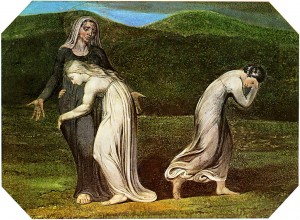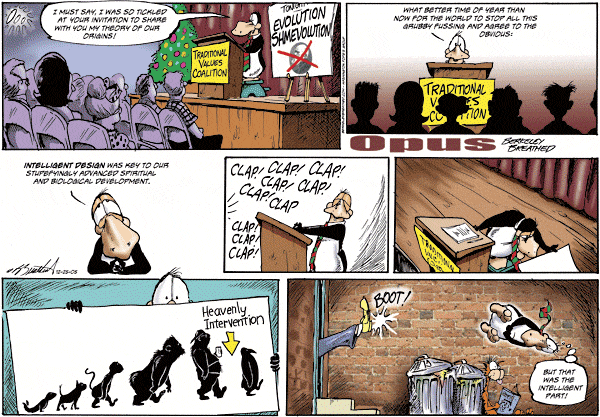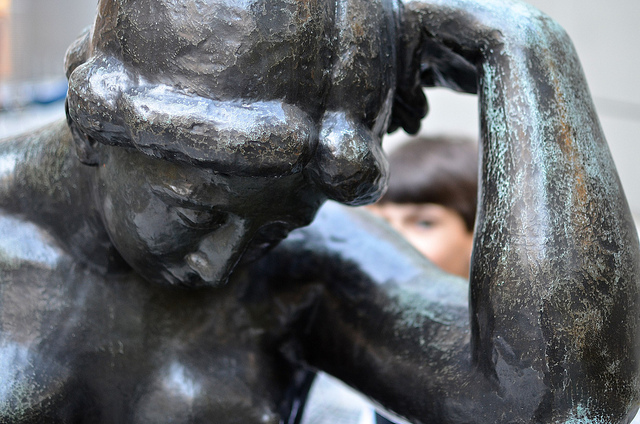I am now working on moving two papers I have presented on Boaz into (likely) a single article for submission to a journal to be named later. In re-reading my paper “Boaz Centrally Marginalized” it occurred to me that men as a whole are very deliberately moved to the edges of the book of Ruth. Consider these few points:
-

Is it really all about the women? Perhaps so. Elimelech, Machlon, and Chilion never speak, they just die, a key element of the story, but a silent one nonetheless.
- Boaz reacts he never initiates. As I have argued in that paper, all of Boaz’s actions, even chapter 4, are reactions to the initiatives of Ruth.
- The only other important male figure isn’t even given a name, he is simply פְּלֹנִי אַלְמֹנִי, “so and so.”
There are a few other instances where men are given speech (the young men reporting to Boaz and the elders at the gate in chapter 4) but they are anonymous and without any depth or character.
At this point I have read many, many commentaries and articles on Ruth so perhaps someone has already said this and I have either missed it or assimilated it into my own thoughts. What do you think? Is Ruth far more women-centric than we have thought, are the men really marginalized? And are there others who have said this all before that I have missed?




18 thoughts on “Are Men Marginalized in Ruth?”
I have suggested similar things in teaching. However, I wonder if it is that men are “marginalized” or merely that women are “demarginalised”. Boaz talks a lot, he’s verbose. He’s just not the one doing the ordering around 😉
I wonder where I got the idea from, possibly Phylis Trible? It dates back decades in my teaching… But I don’t recall seeing a more recent study that pulls it together…
Men are certainly on the periphery in Ruth, so I suppose that’s “marginalized” by definition. I’ve heard comments along these lines before, but I’ve never seen anything of the sort put into print, for what it’s worth.
The first chapter of Gospel Women by Richard Bauckham is called “The book of Ruth as key to the gynocentric reading of scripture.” By androcentric, Bauckham explicitly says that thisterm refers to the marginalization of women, so by gynocentric, I would say that he means that this book marginalizes men.
He reviews literature by Carol Myers, A. Brenner, P. Trible, etc.
Thanks Sue! I think I have read Bauckham but I will go back and read it again. The general idea is not new, that I know. Putting it all together like this…? Well, I have some more work to do.
An unprocessed thought (what else are blogs for?): I wonder if it’s less that Boaz is male, than that Boaz is a Judahite/Davidic ancestor. Here’s why.
My first thought was of the Joseph novella (Gen 37-50): Joseph is the central character, but in another sense the story is “really” about Judah. He develops as a character from one who sold a (Rachel-born) brother into slavery to one who offered his own life in place of another (Rachel-born) brother. The story also explains how he claimed the place as head of his father’s house, despite Joseph receiving the birthright. Even a Joseph-Northern-Kingdom story has a Judah-Southern-Kingdom undercurrent.
So also with the story of Ruth, perhaps: the women are prominent, but the “real” story is the Judah-Boaz-David undercurrent. After all, the book begins with Bethlehem and ends with David.
I realize that Genesis and Ruth have different purposes, but they seem to be indirectly “hooked” onto the main Judah narrative.
Does that make any sense? Am I reading into the narratives too much?
Benj – Certainly there are many who would read Ruth against/with other texts, particularly Gen. 38 and comparisons of Ruth to Tamar. I have to say, I am not entirely convinced of the description of the Joseph cycle as being about Judah. Certainly that is part of its function in its canonical form, but it is clearly a story about Joseph.
Now, Boaz being the father of David is, absolutely key to this story and Ruth’s foreign status is of course vital. While I am not ready to say that Ruth was composed during and because of Ezra’s reforms, certainly the book of Ruth is relevant to that debate.
Like the Joseph the narrative, Ruth (and any book) can have multiple facets of meaning. Notice, I am not saying “interpretation,” we are certainly creative about coming up with nearly infinite interpretations of anything. What I am saying is that the author of the book of Ruth may have had several agendas that he was pursuing through the course of this single work. I am becoming more and more convinced that one purpose was to show the strength and centrality of women in their own right.
On reflection, I don’t think that men are marginalized in Ruth in the same way that women are marginalized elsewhere. When women are marginalized they are either absent, silent or victims of violence. But male authority and patrilineage are intact in Ruth. The women do not deprive or damage the men, they honour men.
This is unlike the life of David, which overall does not honour Michal, Bathsheba, etc. Women are powerless in David’s life. Almost. There are some counter examples. But you have to imagine what it is like to be a little girl in Sunday School listening to the story of David. Honour and glory for David, and divorce and shame for the women in his life. But Boaz is the recipient of honour in Ruth, even if he is not the initiator of the action.
Thanks for the continued discussion Sue. I am not suggesting that the way in which men are/may be marginalized in the book of Ruth is anything like that of women elsewhere in the Bible. That being said, your first two of the three categories of how women are marginalized, absent and silent, do largely describe men in the book of Ruth. As Jim Getz pointed out in the comments on my original post (see link above) even when Boaz does speak his archaic language serves to marginalize him and make him seem almost anachronistic and quaint.
I take your point about David and it is one that I often make. (For example, in this sermon: http://targuman.org/blog/2009/08/12/the-example-of-david-good-or-bad/ ) I would argue that the way he treated the women in his life is intended to be understood not as acceptable behavior but rather as examples of his severely flawed character, one that is redeemed only through repentance.
Back to Boaz… If my argument is correct, than the “honor” bestowed upon Boaz is primarily lip-service, offered by Ruth in order to get Boaz to do that which she needed him to do. True, he is largely depicted as an upright individual (not a scalawag or a saint) but not much more.
Chris,
It is an interesting point of view, and I would agree in part, that the planning and agency are on the part of the women. However, male authority is not undermined or ‘used.’ Naomi gets a grandson, but Boaz gets descendants and a position for his name in the genealogy. The laws regarding widows and orphans, and resident aliens, are shown to be effective. Patriarchy is demonstrated to be a system that works.
On the other hand, there is another passage in which the expression “mother’s house” occurs, that is in the story of Rebecca. Rebecca does ultimately undermine Isaac’s authority. But this too seems to contribute to the national narrative, the ascendency of Jacob over Esau.
I don’t see these narratives as marginalizing men. Men are still the bearers of legal authority, and stand at the centre of the genealogies. However, given that women lack authority, the only way that they can have agency is by some other avenue. Just because women ALSO have power, I don’t see that as making the man “quaint.” Boaz’ language is not so much anachronistic, as it is ritual. Male authority can be exercised through ritual, female power is often exercised through attracting sexual activity leading to conception.
In any circumstance where women are subordinate, the only way that they can exercise agency, is in a way that may seem unorthodox to men. But there really is little choice for women. The main point to me seems to be that the agency of women does NOT undermine men, but furthers their position within their own stories. Tamar ensures that Judah is the ancestor of David, Abigail furthers David’s interest, Miriam protects Moses, (except when she doesn’t and then she suffers.)
It must be taken as assumed that Ruth (both the figure and the book) remain within a patriarchal society. The degree to which they are “marginalized” then is cannot be the same as that of women. So no, the men are not “undermined” (not a term I introduced to this discussion) but they are manipulated and, in that they are now simply that, pawns or pieces to be manipulated by others, even if according to their (the men’s) own rules, then they have been marginalized.
I sense, Sue, that you infer that I am suggesting that some sort of equality for Ruth and Naomi is being advanced in the book of Ruth and, given that assumption, you are rightly pushing back, saying No, they are still very much subordinate in the society. Now forgive me and ignore what follows if that is not something of your reading and response. I am not suggesting equality of women and men in this story. Rather a fleeting and perhaps penetrating insight into how women may have worked within their culture in order to achieve their own ends and security. It is really, I think, a rather modest proposal and I do recognize it is not altogether new.
Now as for the language of Boaz (and Naomi) Campbell, citing someone I cannot remember since my AB commentary is in the office, Rendsburg and Holmstedt have all argued that the language is archaic, showing older forms than the rest of the speakers in the book and indicative of Naomi and Boaz as being of the same generation and (much) older than Ruth. So I don’t think the language is ritualistic (unless Naomi herself is engaging in ritual language and the context for speech by both would not suggest it), although your other comments regarding the use of ritual as power remain sound.
Naomi Campbell? Now _that_ changes everything!
PS Overall, I agree with your paper. I am just discussing the details, and perhaps expressing them with slightly different language. This is definitely, in my mind, a story in which women drive the action.
Thank you! I greatly appreciate this discussion! It has helped me tremendously in developing my thoughts on this line of discussion.
Chris,
Thanks for your response. I wasn’t really thinking of the text in terms of equality or subordination, except as context. That is, when women are subordinate, often they have no option except to resort to what men call ‘manipulation.’
But the difference for me is this. Michal is the ultimate pawn. She is played twice by David in order to secure his position as king. And she is neither loved nor does she become a mother. She loses the only man who loves her and is unloved by the man she loved. This is who I would refer to when I say, “woman is a pawn of the text.” She loses all.
Boaz on the other hand, is not shown to suffer as a result of Naomi and Ruth’s “manipulation” of him. To me Boaz is really not a pawn in the way that Michal is.
I do want to say that overall I agree with most of what you are saying. But I am uncomfortable with an emphasis on Boaz being a pawn in the same way that Michal was.
Sue, but that is what I was trying to say in my last response, I am NOT trying to suggest that Boaz was a pawn “in the same way that Michal was.” (And that story is even more complicated; David was the first or the only man to use her as a pawn.)
PS Point taken about the archaic language.
Another bit of bibliography, not that any more is needed. Timothy Lim’s paper on “literary voice in Ruth” (in the Festschrift for Graeme Auld) interacts with these concerns. FWIW!
Thanks David! Good reminder. Timothy had said he would send it on when I presented my paper last spring and one of us forgot. 😉 I will take responsibility for that!